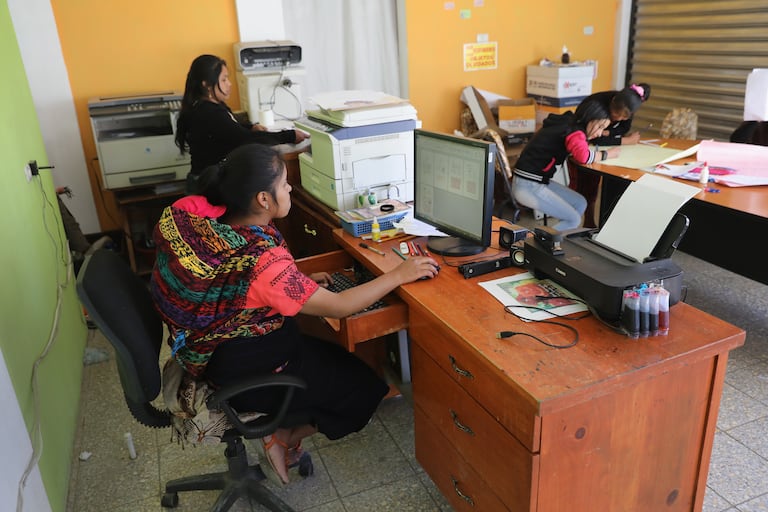A woman works with her baby on her back in Cajolá, Guatemala.John Moore / Getty Images
Since the end of the 70s of the last century, the United Nations Children's Fund (Unicef) coined a phrase that reveals one of the most agonizing realities in Guatemala: "Being a child in Guatemala is a high-risk condition" .
Recent studies by organizations such as Save the Children confirm that this situation, far from receding, has worsened.
A report by the NGO, called
The Multiple Faces of Exclusion
(2018), reveals that out of 28 countries evaluated, Guatemala ranks last when analyzing the seriousness of its childhood risks.
The study emphasizes the main deficiencies: health, malnutrition, lack of access to education, child labor, forced marriages, extreme violence and pregnancies of girls and adolescents.
On this last point, the figures are alarming.
During the weekend, on the occasion of commemorating the
World Day to prevent pregnancy in girls and adolescents
, the local chapter of the Observatory for the Rights of the Child (Ciprondeni) published scary statistics: from January to August of this year have registered 11 pregnancies every day in girls whose ages range between 10 and 14 years, and 10 pregnancies every hour in adolescents between 15 and 19. According to the report, the number of minors with children or pregnant women reaches the chilling figure 965,631, in a country of 16.5 million inhabitants.
It is a secular problem, whose roots are in the lack of education in subjects such as sexual health, a real taboo in the ultra-conservative Guatemalan society and where the churches, particularly the neo-Pentecostal sects, acquire more influence every day.
"To this is added the cave mentality that deprives society of the issue of sexual and reproductive rights," says the attorney for Human Rights, Jordán Rodas, who stresses that this has nothing to do with abortion, understood as the murder of a defenseless being, which the obscurantist sectors proclaim.
“If the State does not provide sexual and reproductive rights education, the cases will continue to rise.
To this must be added the impunity in which these cases remain.
We are talking about crimes [the law in Guatemala considers sexual relations with minors under 14 as rape], ”adds Rodas, and urges the State not to keep complicit silence, to take action on the issue of educating to prevent, and the justice so that it does not remain in impunity.
“It is necessary that there are clear messages so that this, an abominable crime, has an exemplary punishment.
There is also a lack of social empathy, putting ourselves in the shoes of girls whose wings are clipped, their life project changed ”.
Gloria Prado, vice president of the Court of Honor of the College of Psychologists of Guatemala, adds a lesser known but equally devastating element: the sodomy of children and adolescents.
“The cases of pregnant girls are known, but the thousands of cases of sodomized children are ignored.
And they remain silent because they do not get pregnant and because of the stigma to which society would subject them.
The child is much more afraid and ashamed to tell that he has been a victim ”.
In relation to the emotional and biological impact that a pregnancy produces in girls, Prado points out that “a girl is not capable of raising another girl”, to which she adds that the majority of pregnancies between the ages of 10 and 14 they come from rapes within their family environment [parents, cousins, grandparents, uncles…].
"Girls, not having the biological capacity - many even die during childbirth - are emotionally unprepared to raise their baby."
A situation that has significant costs both for the victims and for society.
“There is a cost for the adolescent, which is reflected in adulthood and is reflected in aspects such as health and education.
To your ability to achieve goals according to your life plans.
In the case of women who were mothers in adolescence, only 2% achieved a university degree, compared to 9% of those who were mothers in their adulthood, ”says Ana Luisa Rivas, officer in charge of the Guatemala office of the UN Population Fund (UNFPA)
It adds that those who were mothers before the age of 20 tend to stay at home, performing unpaid activities and, when they can participate in the labor market, there is a gap of up to 30% compared to those who were already in adulthood , which is also reflected in the possibility of having access to health services or education, to close with a message of hope: “There is some progress.
We already have a robust legal and regulatory framework.
The challenge is to implement it.
Since 2015, we have had the National Plan for the Prevention of Adolescent Pregnancy, led by the Vice Presidency of the Republic, where the ministries of Health, Education and Social Development participate, among others, which provides for the inter-institutional approach to this problem ”.



/cloudfront-eu-central-1.images.arcpublishing.com/prisa/TSUEZ7K7S5HNDE7GY53532ZZ7A.jpg)
/cloudfront-eu-central-1.images.arcpublishing.com/prisa/34ZR4HH37ALPAI5BSQHC3V42QE.jpg)


/cloudfront-eu-central-1.images.arcpublishing.com/prisa/EWJ6D24N4FAMNMM5L7QDF7NQFM.jpg)

